For the 2025 school year, there is 1 public high school serving 721 students in Millbury School District. This district's average high testing ranking is 3/10, which is in the bottom 50% of public high schools in Massachusetts.
Public High School in Millbury School District have an average math proficiency score of 32% (versus the Massachusetts public high school average of 44%), and reading proficiency score of 40% (versus the 52% statewide average).
Public High School in Millbury School District have a Graduation Rate of 87%, which is less than the Massachusetts average of 90%.
The school with highest graduation rate is Millbury Junior/senior High School, with 85-89% graduation rate. Read more about public school graduation rate statistics in Massachusetts or national school graduation rate statistics.
Minority enrollment is 29% of the student body (majority Hispanic), which is less than the Massachusetts public high school average of 48% (majority Hispanic).
Overview
This School District
This State (MA)
# Schools
3 Schools
414 Schools
# Students
1,650 Students
327,892 Students
# Teachers
130 Teachers
27,777 Teachers
Student : Teacher Ratio
13:1
13:1
District Rank
Millbury School District, which is ranked within the bottom 50% of all 393 school districts in Massachusetts (based off of combined math and reading proficiency testing data) for the 2021-2022 school year.
The school district's graduation rate of 85-89% has decreased from 90-94% over five school years.
Overall District Rank
#236 out of 397 school districts
(Bottom 50%)
(Bottom 50%)
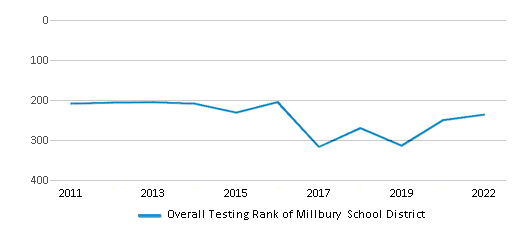
Math Test Scores (% Proficient)
39%
41%
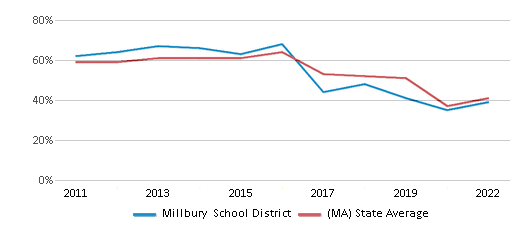
Reading/Language Arts Test Scores (% Proficient)
41%
44%
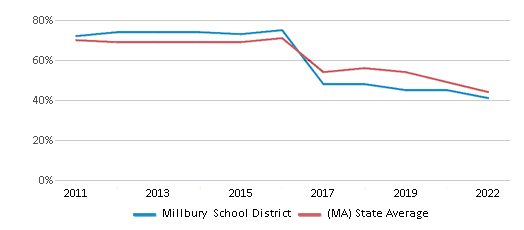
Science Test Scores (% Proficient)
41%
44%
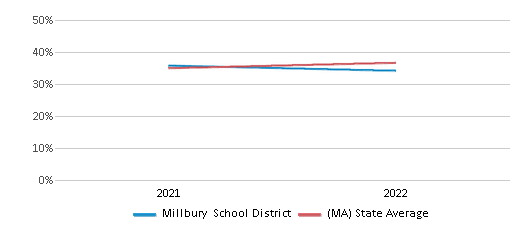
Graduation Rate
85-89%
90%
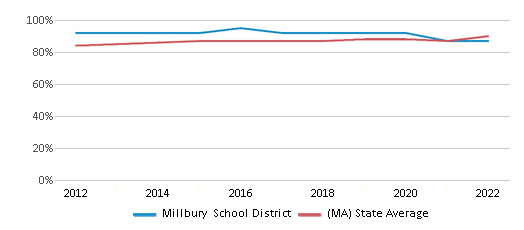
Students by Ethnicity:
Diversity Score
0.45
0.66
# American Indian Students
1 Student
846 Students
% American Indian Students
n/a
n/a
# Asian Students
75 Students
23,209 Students
% Asian Students
5%
7%
# Hispanic Students
175 Students
82,718 Students
% Hispanic Students
11%
25%
# Black Students
85 Students
37,509 Students
% Black Students
5%
12%
# White Students
1,209 Students
168,963 Students
% White Students
73%
52%
# Hawaiian Students
1 Student
298 Students
% Hawaiian Students
n/a
n/a
# Two or more races Students
97 Students
13,053 Students
% of Two or more races Students
6%
4%
Students by Grade:
# Students in PK Grade:
93
972
# Students in K Grade:
108
1,564
# Students in 1st Grade:
134
1,660
# Students in 2nd Grade:
127
1,779
# Students in 3rd Grade:
103
1,764
# Students in 4th Grade:
122
1,783
# Students in 5th Grade:
111
2,733
# Students in 6th Grade:
131
5,100
# Students in 7th Grade:
106
8,799
# Students in 8th Grade:
120
12,237
# Students in 9th Grade:
138
73,757
# Students in 10th Grade:
115
73,439
# Students in 11th Grade:
126
71,886
# Students in 12th Grade:
113
68,770
# Ungraded Students:
3
1,649
District Revenue and Spending
The revenue/student of $26,628 is higher than the state median of $23,845. The school district revenue/student has stayed relatively flat over four school years.
The school district's spending/student of $24,518 is less than the state median of $24,602. The school district spending/student has stayed relatively flat over four school years.
Total Revenue
$44 MM
$21,850 MM
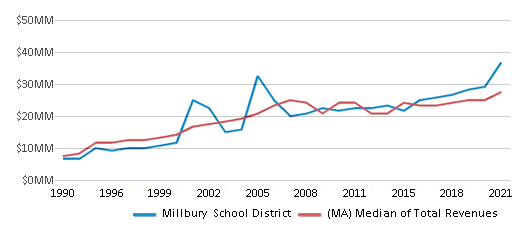
Spending
$41 MM
$22,544 MM
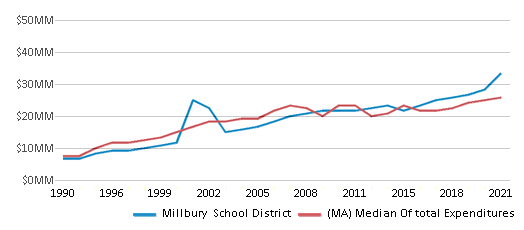
Revenue / Student
$26,628
$23,845
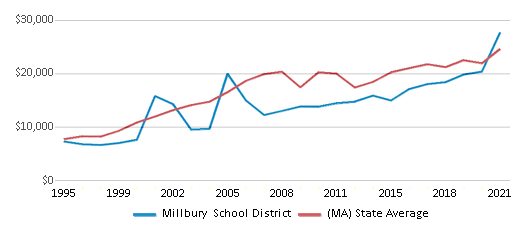
Spending / Student
$24,518
$24,602
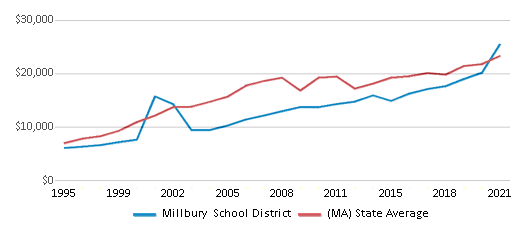
Best Millbury School District Public High Schools (2025)
School
(Math and Reading Proficiency)
(Math and Reading Proficiency)
Location
Grades
Students
Rank: #11.
Millbury Junior/senior High School
(Math: 32% | Reading: 40%)
Rank:
Rank:
4/
Bottom 50%10
12 Martin Street
Millbury, MA 01527
(508) 865-5841
Millbury, MA 01527
(508) 865-5841
Grades: 7-12
| 721 students
Recent Articles

Year-Round Or Traditional Schedule?
Which is more appropriate for your child? A year-round attendance schedule or traditional schedule? We look at the pros and cons.

Why You Should Encourage Your Child to Join a Sports Team
Participating in team sports has a great many benefits for children, there is no doubt. In this article you will learn what those benefits are.

White Students are Now the Minority in U.S. Public Schools
Increasing birth rates among immigrant families from Asia and Central and South America, combined with lower birth rates among white families, means that for the first time in history, public school students in the United States are majority-minority. This shift in demographics poses difficulties for schools as they work to accommodate children of varying language abilities and socio-economic backgrounds.





